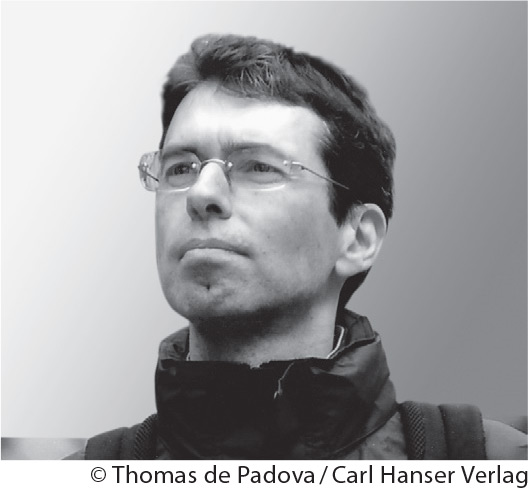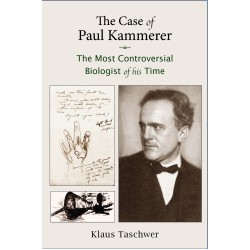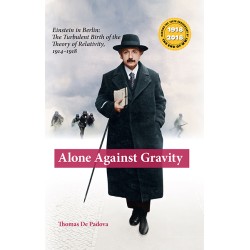New at Bunim and Bannigan
The Case of Paul Kammerer
Model: 026
Author: Klaus Taschwer
With a background in the sociology of science, political science and
philosophy, Klaus Taschwer lives in Vienna and is the science editor of
the Austrian newspaper Der Standard. He is the founding editor of the
science magazine heureka!, the co-author of Konrad Lorenz. A Biography
and recipient of the 2016 Austrian State Award for Scientific
Journalism.
Reviews:
"The Case of Paul Kammerer is a highly readable story and well-researched historical account of a remarkable biologist. Largely forgotten, Paul Kammerer was a talented, idealistic, childish and exasperating Viennese biologist, whose suicide following accusations he'd falsified the results of his groundbreaking research made headlines worldwide. Vienna in the first quarter of the twentieth century formed the backdrop to Kammerer's life, which began when the city was at its creative peak yet already showing signs of its rapid and atrocious decline into Nazism. Taschwer's important book reads like a detective story, uncovering new information concerning the allegation of fraud and providing a convincing explanation for the events that drove Kammerer to suicide. It is a careful, fascinating and chilling exposition of crimes against science and humanity and a plea for open-mindedness about past history and present agendas." — Eva Jablonka. Eva Jablonka is professor at The Cohn Institute for the History of Philosophy and Ideas at Tel-Aviv University, and co-author of The Evolution of the Sensitive Soul.
"Taschwer's biography is worth reading among others for its skilful and informative account of the history of biology since Lamarck:' — Peter Jungwirth, Wiener Zeitung extra.
"By placing the case of Kammerer in the context of Vienna's academic antisemitism and nationalism, Klaus Taschwer gives the story a new twist: it now symbolizes the once splendid, scientific Vienna's downfall, through its own fault, into pure mediocrity:' — Michael Hagner, Frankfurter Allgemeine Zeitung.
Alone Against Gravity - Einstein in Berlin
Model: 024
Alone Against Gravity
Einstein in Berlin: The Turbulent Birth of the Theory of Relativity, 1914-1918
By Thomas de Padova
Translated by Michal Schwartz
This informative and suspenseful book depicts Albert Einstein in a new light and illustrates the emergence of his general theory of relativity in the midst of the first world war. It shows how far Einstein as a single researcher could reach, and how he transformed from being a 'pure' scientist and an apolitical man into a politically engaged person and a pacifist by conviction.
Berlin was the mecca of physics in the beginning of the 20thcentury. In April 1914, following an invitation initiated by Max Planck, Walther Nernst, Fritz Haber and the crème de la crème of Berlin’s scientists, the 35-year-old Einstein accepted a position at the prestigious Royal Prussian Academy of Sciences. Einstein wanted to take advantage of the academic freedom and the exchange of ideas in Berlin. His marriage was falling apart, and he had recently fallen in love with his cousin, Elsa Lowenthal who lived in Berlin. He looked forward to both factors of his new life there.
Four months later, Germany mobilized its army and the roaring voices of nationalism filled all the science centers. The outbreak of World War I suddenly changed the activities, minds and relationships of German scientists and of Einstein’s relationships to his colleagues, many of whom joined the war frenzy with violent nationalism. Some changed the focus of their work and created the first weapons of mass destruction. As the war began Einstein said he felt, “alone, like a drop of oil on water, isolated by attitude and cast of mind." However, he remained in the city and at his position.
Thomas de Padova is a physicist and science writer who lives in Berlin. He is the author of award-winning history of science books. In 2014 he was given a journalist-in-residence-fellowship at the Max-Planck-Institute for the History of Science, where he deepened his studies on Einstein and WWI to write this book. The author researched the correspondence, public speeches, newspaper articles and scientific papers of Albert Einstein, Max Planck, Fritz Haber, Walther Nernst, Max Born and other German scientists during 1910 to 1920.

Alone Against Gravity explores why Einstein become a pacifist and how he began to devote himself to political issues. It addresses why Einstein did not move back to Switzerland where he had citizenship and had been living previously. Most importantly, it shows how Einstein - working in the center of a collapsing world - reinvents time and space and finishes his revolutionary theory about general relativity.
Dancing On A Powder Keg
Model: 019
Dancing on a Powder Keg
The Intimate Voice of a Young Mother and Author, Her Letters
Composed in the Shadow of Hitler’s Third Reich;
Her Poems from the Theresienstadt Ghetto
By Ilse Weber
Translated and Foreword by Michal Schwartz
Ruth Bondy on Theresienstadt
Afterword by Ulrike Migdal
”I have read many accounts, but this account by someone who did not survive… is exceptional.”
- Prof. Yehuda Bauer, Yad Vashem
”This sobering, respectful collection brings a haunting legacy out of the viciousness of the war.”
- Karen Rigby, Foreword
“Dancing on a Powder Keg addresses the coming tide of the Holocaust, the heartache of saving a child by sending him away, and the reality and horror of Theresienstadt. This is a haunting and unnerving narrative of one woman’s world being destroyed.”
- Renita Last, Jewish Book Council
When asked, "Who is a heroine of the Holocaust?" most people immediately respond: Anne Frank. With the publication of her diary after war she became THE female icon of the Holocaust, though she was only a child. There were women who were also heroines, and their courageous stories are only now coming to light. "The fate of Jewish women and the specific problems they faced is a topic that has barely been touched upon," says Professor Yehuda Bauer of Yad Vashem and an international authority on the Holocaust. “I have read many accounts, but this one (Dancing on a Powder Keg) by someone who did not survive, and whose story has been reconstructed, is exceptional." he says.
Ilse Weber, from Czechoslovakia, deserves recognition. Dancing on a Powder Keg which contains 100 letters and 63 poems written by Ilse between 1933 and 1944 will endear her to the hearts of American readers. This is the first time Ilse's letters, songs, and poems, originally written in German, have been published in English. The book contains photographs, drawings, and two background essays by leading experts.
Ilse was a wife and mother, a radio personality, a musician, an author and a published poet. Dancing on a Powder Keg reveals her multi-faceted life living in Prague before the war. It depicts how her family, career and emotions unraveled as the Nazis gained power.
Ilse, her husband Willy, and her younger son Tommy were imprisoned in the Theresienstadt ghetto from 1942-1944. Ilse worked in the children's infirmary and sang to the young patients. She risked her life writing poetry about the dire circumstances. Language offered a refuge and consolation to Ilse and her fellow inmates benefited from her writing. Ilse's poems were recited and memorized by thousands of people in the ghetto, and survivors say the poems kept their spirits alive.
In 1944, Ilse volunteered to accompany the sick ghetto children on their transport to Auschwitz. Upon arrival, she sang her beautiful lullaby, Wiegala, to calm the children as they were led to the gas chambers. Both Ilse and her son Tommy perished along with them. Wiegela has been recorded and performed by singers across Europe. It is currently featured in the Tony nominated Broadway show Indecent. Ilse's poignant poem Letter to My Son is featured on a YouTube video, with Ilse's grandson in the audience. (Ilse's family and the miraculous discovery of the letters provides another layer to her story narrated in Ulrike Migdal's afterword).






